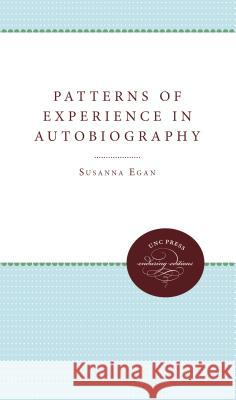Patterns of Experience in Autobiography » książka
Patterns of Experience in Autobiography
ISBN-13: 9780807865330 / Angielski / Miękka / 2011 / 240 str.
Egan asks why autobiographers use patterns -- such as myths of paradise and paradise lost, the journey, conversion, and confession -- taken from fiction to express personal experiences. She suggests that these stages of the written life derive from psychological imperatives that determine how the self and the world are perceived. She examines the autobiographical works of Rousseau, Wordsworth, George Moore, and Thomas Carlyle and the writings of William Hale White, De Quincey, and John Stuart Mill.
Originally published in 1984.
A UNC Press Enduring Edition -- UNC Press Enduring Editions use the latest in digital technology to make available again books from our distinguished backlist that were previously out of print. These editions are published unaltered from the original, and are presented in affordable paperback formats, bringing readers both historical and cultural value.
Egan asks why autobiographers use patterns -- such as myths of paradise and paradise lost, the journey, conversion, and confession -- taken from fiction to express personal experiences. She suggests that these stages of the written life derive from psychological imperatives that determine how the self and the world are perceived. She examines the autobiographical works of Rousseau, Wordsworth, George Moore, and Thomas Carlyle and the writings of William Hale White, De Quincey, and John Stuart Mill.Egan asks why autobiographers use patterns -- such as myths of paradise and paradise lost, the journey, conversion, and confession -- taken from fiction to express personal experiences. She suggests that these stages of the written life derive from psychological imperatives that determine how the self and the world are perceived. She examines the autobiographical works of Rousseau, Wordsworth, George Moore, and Thomas Carlyle and the writings of William Hale White, De Quincey, and John Stuart Mill.











